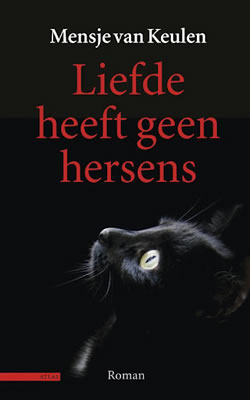Mensje van Keulen
Love has no Brains (Liefde heeft geen hersens)
A refined psychological game
We find ourselves in a seemingly ordinary situation of the sort Mensje van Keulen favours for her stories and novels. She is a subtle storyteller with a sharp eye for significant, often slightly bizarre details that give her work a melancholy atmosphere and considerable power. Her characters are not superheroes, indeed they could be the man or woman next door. In Liefde heeft geen hersens (Love has no Brains) a slightly shabby block of flats serves as the realistic facade behind which all kinds of things turn out to be happening.
The heroine of the novel is called Romy. She was named after Romy Schneider by her mother, a fan of the ‘Sissy’ films. Van Keulen’s readers will know that this is not without significance. Like her namesake, Romy appears sweet and charming, helpful and loyal, but she is not rewarded for it in her life. The very opposite, in fact. Loveable though Romy may be, it seems no one can stay close to her for long. Her deceased husband, kept in an urn in the bedroom wardrobe, was a philanderer; her children avoid her and her love life is going nowhere.
When Romy finds her elderly neighbour, a former ballet dancer called Irma for whom she cleans and does the shopping, dead in her own home one day, she panics. ‘I’m not looking at a peaceful face with old, familiar features. It’s not even empty, it’s a face left, as if by a spasm, with a lasting expression of horror.’ When Romy takes a good look around, she realizes a statuette is missing from Irma’s flat and Freddy the black cat has vanished. Romy can’t help suspecting her son Cristian, who stole something from Irma once when he was a boy. For help she turns to Harro, the caretaker, a former lawyer who still lives at home with his mother. She even decides to remove any cause for suspicion by sprucing up Irma’s body a little. She’s often seen it done during her time helping out as a hostess at the St. Francis cemetery in The Hague.
From this point on Liefde heeft geen hersens has the pace and suspense of a whodunit. We hear from a small parade of characters around Romy, each of whom turns out to have a hidden motive and might well have been involved in elderly Irma’s death. As well as Romy’s son, Harro seems to be involved in something shady. It becomes clear he is a voyeur who loves staring at images from the building’s security cameras, and it’s he who has been stalking Romy.
At the end of the book there is still room for dispute about exactly what happened. Mensje van Keulen keeps us glued to the book right to the very last line, playing a refined psychological game with her characters. An episode from the midst of the main character’s life ends with a sigh that beautifully evokes a sense of tragedy: ‘Rain brings oxygen, Romy. Stay there and take a deep breath, then another, and another. Just let it rain on these flats, this city; let all that water fall and applaud.’
Publisher
Atlas
Herengracht 481
NL - 1017 BT Amsterdam
TEL. +31 20 524 98 00
FAX +31 20 627 68 51
E-mail: [email protected]
Website: www.uitgeverijatlas.nl
Publishing details
Liefde heeft geen hersens (2012, 192 pp)

Biography
Mensje van Keulen (b. 1946) first wrote exclusively for adults: Bleekers zomer (Bleeker’s Summer, 1972) was her remarkable first novel. It is now considered a modern Dutch literary classic, and so is her short-story collection Allemaal tranen (So Many Tears), published in the same year. In the eighties, inspired by her son, she started writing for children as well. Since then several juvenile stories and the nonsensical ABC Van Aap tot Zet (From Ape to Zest, 1990) have appeared, with powerful caricatures and exaggerations in expressive language, enlivened with an effervescent humour. Her first children’s book, the crazy Tommie Station (Tommy Station, 1985), was immediately awarded a Silver Slate Pencil and made into a theatre spectacle. In 1987 the Cinderella-like fairy-tale Polle de orgeljongen – of het ijskoude hart van Mora (Polle The Organ Boy – Or Mora’s Ice Cold Heart) appeared. Vrienden van de maan (Friends Of The Moon, 1989), an exciting vampire story, was awarded the biannual Nienke van Hichtum Prize, and Meneer Ratti (Mr Ratty, 1992) is about a nasty man who is shown, deep in his heart, to be human after all. For adults Van Keulen published altogether more than ten novels and story collections, her latest novel being De laatste gasten (The Last Guests, 2007). Van Keulen’s writing is characterized by carefully developed narratives and well-constructed plots. Hella S. Haasse lauded her ability to create a rounded character in a few sentences.
Website: www.mensjevankeulen.nl/
Sample translation
Quotes
“Technically perfect, stylistically beautiful, with searing content – what more could you want?”
― De Groene Amsterdammer
“Van Keulen manages to make her damaged or deranged characters into people of flesh and blood so that, swept along by the book, we accept them as entirely normal. […] Her prose reads as a loud ‘no’ to condemnation of our fellow human beings.”
― Vrij Nederland
Category
Genre: fiction
